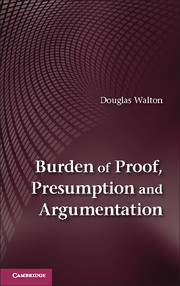Book contents
- Frontmatter
- Dedication
- Contents
- Acknowledgments
- 1 Introduction to Basic Concepts and Methods
- 2 Burdens of Proof in Legal Reasoning
- 3 Presumption in Legal Reasoning
- 4 Shifting the Burden of Proof in Witness Testimony
- 5 Burden of Proof in Dialogue Systems
- 6 Solving the Problems of Burden of Proof
- 7 Burdens of Proof in Different Types of Dialogue
- 8 Conclusions
- Bibliography
- Index
8 - Conclusions
Published online by Cambridge University Press: 05 July 2014
- Frontmatter
- Dedication
- Contents
- Acknowledgments
- 1 Introduction to Basic Concepts and Methods
- 2 Burdens of Proof in Legal Reasoning
- 3 Presumption in Legal Reasoning
- 4 Shifting the Burden of Proof in Witness Testimony
- 5 Burden of Proof in Dialogue Systems
- 6 Solving the Problems of Burden of Proof
- 7 Burdens of Proof in Different Types of Dialogue
- 8 Conclusions
- Bibliography
- Index
Summary
Previous chapters have shown that formal dialogue models of argumentation, along with tools from AI like the Carneades Argumentation System and the abstract argumentation framework, apply very well to modeling burden of proof and presumption in the well-organized, rule-directed framework of a legal trial. The objection posed in Chapter 1 was that the legal concepts of burden of proof and presumption have been illicitly transferred from the legal setting to public policy discussions and other arenas where the argumentation is not structured in the same way it is in a legal setting. Chapter 8 takes up this challenge by arguing that the formal dialectical framework of Chapter 4 can be usefully applied to modeling burden of proof and presumption in these other settings. This argument, of course, does not claim the burden of proof and presumption work in every respect in the same way they work in other settings. It only means that the methods used to reason about evidence in the common law system presents an outline of reasonable but defeasible argumentation that has some important features, represented in the dialogue models of burden of proof and presumptions presented in the previous chapters of this book, and these features can be adapted to and applied in a helpful manner to other settings of argumentation outside law.
Of course there are many different settings in which argumentation is used as a means of proving a hypothesis, settling a conflict of opinions based on evidence brought forward or arriving at a rational decision on how to make a choice in a deliberation on what to do in a situation requiring such a choice, as indicated in Chapter 7. For the purposes of this book, however, there are two main settings that seem to be of main interest in relation to the issue of transferability of the legal notions of presumption and burden of proof. One is the kind of organized disputation of the kind represented in a forensic debate, or to cite a specific example, a presidential debate that has a moderator and is televised to a large audience.
- Type
- Chapter
- Information
- Burden of Proof, Presumption and Argumentation , pp. 245 - 284Publisher: Cambridge University PressPrint publication year: 2014



